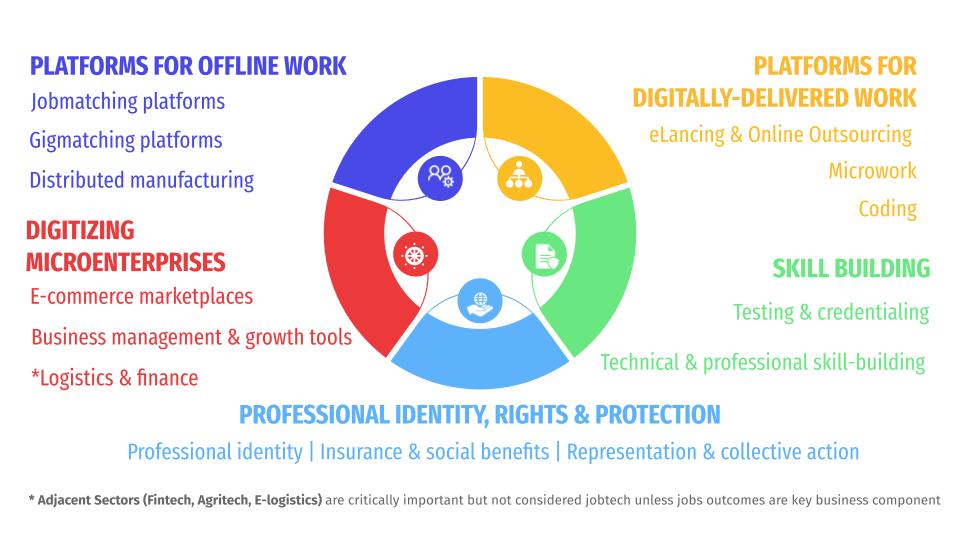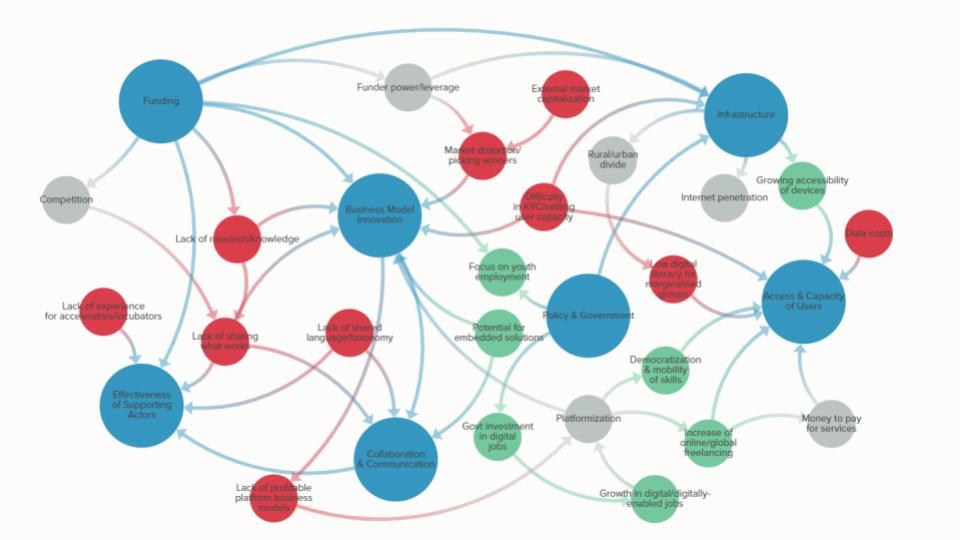Author: Chris Maclay
“I often say that an entrepreneur starting a venture today versus the starting the same venture a few years ago, the chances of that person succeeding is now dramatically different because the ecosystem is just so nutrient rich.” Tony Chen, Partner at Verdant Frontiers and Co-Founder of Kinyungu Ventures.
When I listened to the first episode of Tayo Akinyemi’s The Trajectory Africa podcast where she interviewed investor Tony Chen, I was excited and frustrated in equal parts. Excited, because I agreed with the general premise of opportunity in the African start-up space, and frustrated, because many of these features I was hearing about could not be said about the space which I cared most about: jobtech*.
I had recently sat on the Advisory Board of Village Capital’s Future of Work Africa Accelerator, the first (that I am aware of) pan-African accelerator focused on start-ups in the jobmatching, gigmatching, and edtech-for-employment space. I had to review eight (already shortlisted) applicants. Four of the eight had the same business model – a matching platform for blue collar workers, where a customer makes a request and different workers bid for the job, and the app charges a percentage of commission. A business model I was very familiar with, as I had tried to implement it as COO of Kenyan gigmatching platform, Lynk, fully four years earlier. I say tried, as it hadn’t worked (you can read more here). Nor had it worked for the handful of other such start-ups in Kenya that tried the model, and the dozens of others that had done so across the continent. Lynk changed its model years ago – to a much more operationally implementable and scalable model, itself with plenty of challenges (more in later episodes) – but it took years (and plenty of money) to learn these lessons. These lessons that had been learned by Lynk, however, had not been learned by the wider ecosystem. If the ecosystem even existed at all…
A big problem with big solutions needed
18 million young people entered the labour market in Sub-Saharan Africa last year, and only three million formal sector jobs were created. By 2030, 30 million will be entering the labour market each year. Youth unemployment is a massive challenge that requires integrated approaches and investment from public and private sectors. Education and training, investment policy and labour laws, financial services and social and gender norms, among others, all play huge roles in how young people access opportunity. Technology will not solve the youth unemployment problem in itself. Far from it. However, if experience from elsewhere in the world tells us anything, it’s that technology is going to play a significant role in how young people of the future are skilled and connected to opportunity. Moreover – with exceptions – the role of technology in work on the continent is under-addressed.
In most emerging markets, particularly in Africa, jobtech has yet to truly catalyse positive breakthrough solutions – few start-ups have truly succeeded to create livelihoods opportunities at scale. Specifically, we see:
- Limited business model innovation: Very few business models have been deployed, with entrepreneurs making the same mistakes over and over; and even for many of the innovations that do exist, entrepreneurs are yet to demonstrate viability and scalability.
- Gaps in funding: With exceptions (around digitizing microenterprises and ride hailing/deliveries), few investors in Africa are looking at jobtech. Additionally, the swathes of philanthropic money for youth employment doesn’t really know how to work with (largely) private sector start-ups.
- Ineffectiveness of supporting actors: With little shared knowledge about what does/doesn’t work in jobtech, few accelerators, incubators, or mentors are equipped to support start-ups working in the jobtech space.
- Limited supportive policy development and implementation: Few countries in Africa have policy or regulations set-up to effectively enable innovation and inclusive impact on employment (more on regulation here).
- Lack of enabling infrastructure: Infrastructure that could reduce the barriers to operational and business model success, such as adequate KYC on jobseekers, does not exist – start-ups have to do it all themselves.
- Inadequate access and capacity of jobtech users: Jobtech platforms are still relatively unfamiliar to many jobseekers and employers, and greater visibility of the sector could increase uptake.
- Poor coordination and collaboration among jobtech innovators: Without a clear understanding of who is doing what, there are few opportunities for collaborations and partnerships which have driven forward innovation, scale and impact in other sectors.

Not to be disheartened, with these limitations comes great opportunity. In North America and Europe, jobtech just ‘happened’, and caught everyone by surprise. Almost from one day to the next, employment had moved from full time salaried roles recruited through adverts and recruitment agencies to digitally-mediated gigs. Society was then left to make sense of what this shift meant. In Africa, where jobtech is not yet ubiquitous, we have the opportunity to be ahead of the game, and actually set some of the rails for an emerging sector to ensure that it is as inclusive and impactful as possible.
The Jobtech Alliance was established to build an ecosystem around inclusive jobtech in Africa. Our vision is that technology enables Africans to access and improve work that enhances their quality of life, and we hope that our work will change the underlying conditions that prevent jobtech solutions from thriving.
No single individual or organization can build an ecosystem alone, which is why the Jobtech Alliance was initially set-up by a group of individuals coming from across the ecosystem, including jobtech start-ups (Kandua, Shortlist, and Qiesto), support organizations (Mercy Corps), supply-side organizations training young people (Harambee, Generation Kenya), and research space (Edu Design). Our goal is that the Alliance grows to hundreds of like minded members over the coming years.
The challenge is that the ‘jobtech space’ has not yet been clearly defined or understood, so the undertaking really involves building from the ground up; as one Jobtech Alliance founding member, Sharmi Surianarian, Chief Impact Officer at Harambee Youth Employment Accelerator, explained, “What we’re really doing when we talk about system change is rewiring the system. What’s interesting here is that the cabling has not been laid yet.”
Defining a sector
When I started my role as the Director of Youth Employment at Mercy Corps earlier this year, I was given the mandate to see ‘how Mercy Corps could be useful in the digital and employment space.’ I consulted with over a hundred people – start-ups, support organizations, training providers, funders – and I asked them what sector they worked in. I got about a hundred different answers; ‘jobmatching’, ‘e-commerce’, ‘careertech’, ‘gigmatching’, ‘digital jobs’, ‘edtech’, ‘workertech’, the list continues… I realised that, without even a name to connect the work of these organizations, there was little hope of building a community with a growing shared knowledge base that would prevent the challenge above from happening again.
Language isn’t everything, but language is important. One of the people I consulted above – Paul Breloff, now CEO of a jobmatching start-up in Kenya but previously involved in the financial inclusion space – explained that this fragmented sector I was trying to understand is actually not uniquely special. In fact, it was not drastically different to the sector that we now call ‘fintech’ a decade ago; you used to have ‘microfinance’ as one sector, ‘digital payments’ as another, ‘insurance’ as a third, and it continued… The emergence of language and a narrative around ‘fintech’ as a broader sector started connecting these independent ecosystems – one started seeing dots being connected between different actors, funders that used to look at one smaller sector now looking at the wider space, and shared learnings broadly moving the sector forward.
So step one for the Jobtech Alliance – at the time just a group of eight jobtech practitioners, thinkers and enablers – was creating language that made sense for people within the space, and a basic taxonomy of what exists.
We found that common language in ‘jobtech’, which we define as ‘the use of technology to enable, facilitate, or improve the productivity of people to access and deliver quality work.’ While we love the term ‘platform livelihoods’ championed by Caribou Digital to explain the worker experience of engagement with jobtech, the term ‘jobtech’ stuck for this wider space, due to its linguistic comparability to fintech, edtech, and other growing sectors, its start-up friendliness, and its emergence as a concept in North America, Europe and Asia.

Beyond just a name for this emerging sector, we sought to develop a clearer understanding of what it really was – where did the sector begin, and where did it end? We did this in part with help from our friends at Briter, who helped us develop a taxonomy of what start-ups actors on the continent really saw as fitting into this space. We agreed that there were ‘fuzzy edges’ to these definitions, but that we could broadly group the sector into five buckets:

Much more significant than defining a common language, is developing a community around this emerging space and creating the building blocks for the ecosystem to thrive. The Jobtech Alliance is therefore launching its community at the end of October 2021, with three main workstreams:
1. Developing a community around a common identity
The Jobtech Alliance will bring together start-ups, investors, funders, policymakers, and other allies through meet-ups, conversations, and multiple connection points. We seek to create the connective tissue that enables an ecosystem to thrive – helping to connect the dots, and provide an environment for ideas and collaborations to spontaneously happen. We’ll be hosting regular calls, meet-ups (when conditions permit), WhatsApp groups, and more.
2. Building a knowledge base for jobtech in Africa
The Jobtech Alliance seeks to fill the huge knowledge gaps that exist in the jobtech space, on what’s going on (within the continent and beyond), on what has/hasn’t worked, and on emerging themes. We will develop, curate and share research, learning & resources which benefit the community. You can expect to benefit from:
Mapping and increased transparency: We’ll spotlight interesting jobtech initiatives, as well as conducting mapping of the sector. We’ve partnered with Briter to develop market maps of the jobtech space in Africa (more on the outcomes of that mapping here), and we will be working to showcase what’s happening in the space.
Lessons learned (the hard way): We’ll also be developing research of what’s really going on in the sector, partnering with start-ups and solution providers about what works in the space, as well as learning from the reflections of support organizations in the space. We’ll aim to unpack the box about what really makes jobtech tick. Check out our blog articles here.
Inspirations and new themes: Technology moves quickly, and new themes are constantly appearing both within the continent outside it that we can learn from. What can we learn from South and East Asia’s social commerce successes to create scaled access to e-commerce for microentrepreneurs in Africa? Will play-to-earn videogames become a core new form of digitally-delivered work? We want to share emerging trends from and with those closest to the action.
3. Collaborating against the systemic constraints of the sector
The Jobtech Alliance will drive strategic interventions which respond to system failures in policy, funding infrastructure, or other ecosystem functions. We’ve been working on a systems map to unpack what the biggest constraints to the sector are, and we will gather feedback from the community to decide which areas are of greatest priority, and collaboratively design and engage in strategic interventions which respond to and correct these systemic failures. More information on the sorts of strategic interventions we hope to explore are here.

Join Us
These are just some starting ideas as we set off. But we’d love for you to get involved. Here’s how:
- If you are a jobtech solution builder, funder or support organization, join the Alliance as a member. It’s completely free – we only ask that you join calls and contribute what you know. Find out more and sign up here.
- Share your knowledge. If you’d like to write something, share something, or cross-post an article, please let us know! Just fill out our contact form here.
- Collaborate. If you’re passionate about any of the topics we’ve described here, and can see a way to work together, please get in contact through our contact form here. The Jobtech Alliance is an entirely unfunded endeavour at present, and we could do much more with funding, so please let us know if you’d like to support!

The author is Director of Youth Employment at Mercy Corps. He was previously COO at Kenyan gigmatching start-up, Lynk.

0 Comments